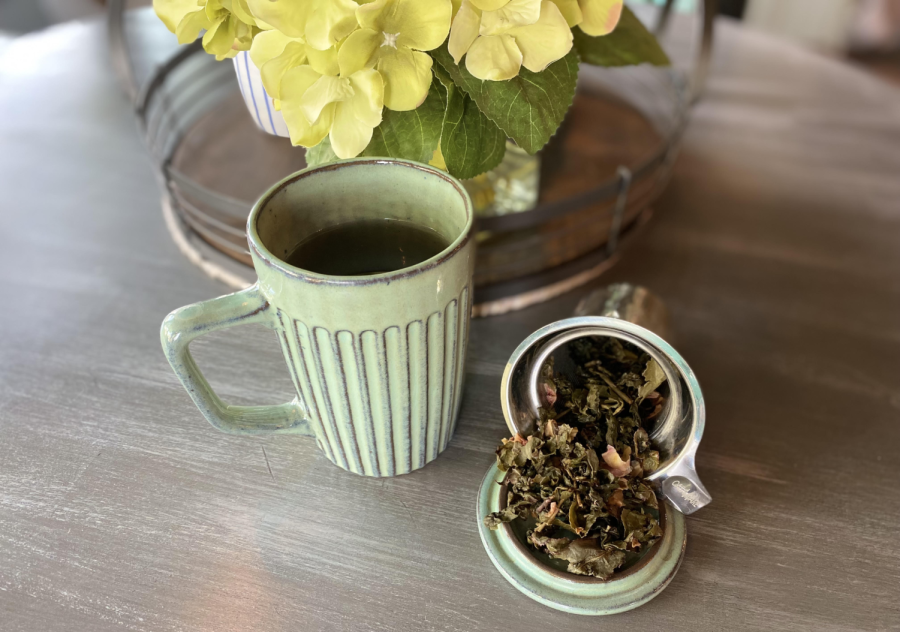The Benefits of Drinking Tea
Photo By Paige Whiteside
A cup of freshly brewed rose oolong tea is a great way to start your day. Oolong tea contains a decent amount of caffeine to keep you awake.
Tea is a popular drink that comes in various forms- but many do not know all of the benefits of drinking tea. Natural ingredients that are in certain teas have been known to improve the skin, help digestion and in some cases, even help to reduce the risks of cancer and heart disease. With a wide range of different types of teas, there are many options to choose from in order to find the best drink for you.
According to Tea USA, an organization dedicated to enabling sustainable growth of the United States tea market, the ages of the average purchasers of tea bags in the US are 35-55 years of age. This is a positive statistic, but the age range of tea drinkers should be greatly widened due to the many benefits that come with drinking tea.
Tea, especially green tea, contains a large number of flavonoids, which are molecules found in many different foods and beverages that have positive effects on the human body. Flavonoids have been found to reduce inflammation, lower cholesterol and help to clear out clogged arteries. Even more, tea is not just another health trend that fades in and out of popularity- the usage of green tea for medicinal purposes dates back to 2737 BC in China. Over the years, a large number of tea drinkers have said that the drink helps them with many different problems, one of these individuals being Denise Larken, a user of Medium, which is a popular blogging website.
“I started drinking [green tea] regularly because it made my diabetes and anxiety feel better. It helped me feel better in general, so I now include it in my weekly shopping and have a cup or two every day.”
Another positive benefit of tea is that it ranges in caffeine levels depending on what kind of tea you are drinking, which gives consumers many different options. Some teas, such as herbal teas, are made specifically with ingredients to help you sleep, like chamomile or lavender. On the other hand, black teas are made to be drunk in the morning to wake you up with the high level of caffeine that it contains.
According to the Sencha Tea Bar, 64 percent of people living in the United States drink at least one cup of coffee a day, which is the highest level in the past six years, with most people doing this for the high level of caffeine that coffee contains. Specific teas can contain the same amount of caffeine as coffee, plus added beneficial ingredients which coffee lacks. This presents tea as the superior choice over coffee. With all of the health benefits, wide ranges of types and flavors and different levels of caffeine, tea is the overall better choice between the two drinks.
As previously mentioned, the amount of caffeine in a drink like coffee is why so many people choose to drink it, using it to keep them awake in the mornings. Tea is strongly overlooked in this category because many do not realize that all of the ingredients and different combinations of leaves and seeds present a wide variety of choices for consumers. For example, matcha green tea contains the most caffeine- around 75 milligrams, which is only 15 milligrams less than the average cup of coffee. In contrast to this, herbal teas do not contain caffeine at all, which makes tea a more versatile drink than coffee.
The caffeine levels of certain teas all depend on the way that the leaves are processed and fermented. Caffeine is a naturally occurring compound that can be found in many plants, including the seeds and leaves of tea and coffee. White teas, which contain little caffeine, go through only two few steps to be fully processed. Withering then drying the leaves of this light tea gets it to its perfect end result. A black tea, however, has to be withered, rolled, fully oxidized and finally dried, which accounts for its strong flavor and high caffeine level.
Teas go through various steps in order to be perfected into their final products. These finely tuned processes which have been practiced for centuries ensure that each type of tea is just right, giving tea drinkers a great taste and product that they desire. The benefits of tea also contribute to the experience, making the drink worth it by providing things like caffeination in order to stay awake, herbs to help encourage good sleep habits and many different internal and external health benefits. With all of these amazing factors that tea has to offer, people should start drinking more of it in order to enhance their life as a whole.

Name: Paige Whiteside
Position: Advisor's Assistant
Graduation year: 2024
A few sentences about me: I am taking...











